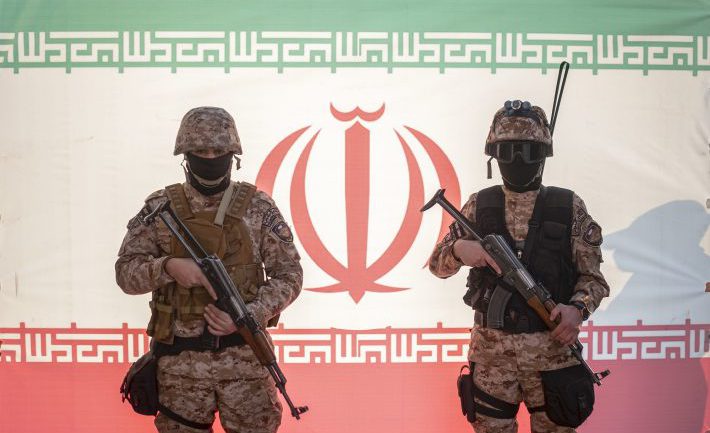Iran shifts strategy to arm Iraqi Shiite militias with advanced weapons, preparing them for future confrontation with Israel after regional losses.
Iran is rapidly expanding its grip on Iraq’s Shiite militias, flooding them with advanced weaponry and cash in preparation for what intelligence sources describe as a “second-front contingency” — a potential future confrontation with Israel.
According to a Kan Reshet Bet report citing Iraqi insiders, Tehran is refocusing its regional war machine toward Iraq after suffering devastating blows in Lebanon, Syria, and Gaza, where Israel’s relentless military operations shattered Iran’s proxy network.
These sources revealed that Iran’s Quds Force, the elite external operations arm of the Islamic Revolutionary Guard Corps (IRGC), is now directing and funding a sweeping rearmament of Iraqi Shiite militias — the same forces responsible for hundreds of attacks on U.S. and coalition troops over the past decade.
Iraq Becomes the New Frontline
“The plan is clear,” one Iraqi security source told Kan. “Iran is building up its proxies in Iraq to ensure that if war with Israel reignites, these groups can strike Israeli interests — from Iraq or even from Syrian territory.”
During the recent Israel-Iran confrontation earlier this year, Iraqi militias launched sporadic missile and drone attacks toward Israel but largely held back after explicit warnings from both Jerusalem and Washington. That restraint, however, appears to have been temporary.
According to the same sources, these militias — including Kataib Hezbollah, Asaib Ahl al-Haq, and other IRGC-linked outfits — have now been resupplied with Iranian-made precision-guided drones, ballistic systems, and advanced anti-tank munitions.
Baghdad’s Grip Weakens, Quds Force Commands
In a stunning revelation, Iraqi officials admit privately that these militias now “outgun the Iraqi army” and operate outside the authority of Prime Minister Mohammed Shia’ Al Sudani.
“They no longer take orders from Baghdad,” the source said. “They take them directly from Tehran — from the Quds Force command.”
This deepening Iranian control underscores Israel’s long-held warning: that Iraq, like Lebanon, is sliding into becoming another Tehran satellite, where militias answer to the Supreme Leader rather than to a sovereign government.
Elections in the Shadow of Iran’s Guns
Iraq’s upcoming parliamentary elections, expected later this month, are unlikely to change that reality. Analysts say the vote will be overshadowed by Iran’s proxy dominance, voter intimidation, and systemic corruption that has allowed militia influence to infiltrate every layer of the state.
Even within the Iraqi military, commanders acknowledge that key units depend on militia support for logistics and manpower — a situation that could collapse entirely if Iran orders a large-scale escalation against Israel or Western targets.
Israel Watching Closely: “Iran’s Next Domino”
Israeli intelligence has reportedly been monitoring Iran’s pivot toward Iraq for months. A senior Israeli defense analyst described it as “a desperate move by Tehran to rebuild deterrence after catastrophic losses in Gaza and Lebanon.”
Following the destruction of Hezbollah’s leadership and the neutralization of Hamas, Iran’s regional strategy — once anchored in Lebanon and Gaza — is now being recalibrated toward Iraq, where the terrain, militias, and political instability offer Tehran a fertile ground for rearmament.
“Iran wants to open multiple fronts to stretch Israel thin,” the analyst said. “But the IDF has already proven it can handle simultaneous theaters. Iraq would be no different.”
The Strategic Picture: Israel’s Foes Weakened but Not Gone
Tehran’s renewed focus on Iraq reveals both its desperation and persistence. While Iran’s dream of surrounding Israel with a “ring of fire” has been severely damaged, its continued investment in Iraq’s militias shows that the regime’s long war doctrine against Israel remains alive.
For now, Israel’s deterrence stands tall — but Iran’s shadow war is evolving, and the next confrontation could come not from Gaza or Lebanon, but from the heart of Mesopotamia.Iran is rapidly expanding its grip on Iraq’s Shiite militias, flooding them with advanced weaponry and cash in preparation for what intelligence sources describe as a “second-front contingency” — a potential future confrontation with Israel.
According to a Kan Reshet Bet report citing Iraqi insiders, Tehran is refocusing its regional war machine toward Iraq after suffering devastating blows in Lebanon, Syria, and Gaza, where Israel’s relentless military operations shattered Iran’s proxy network.
These sources revealed that Iran’s Quds Force, the elite external operations arm of the Islamic Revolutionary Guard Corps (IRGC), is now directing and funding a sweeping rearmament of Iraqi Shiite militias — the same forces responsible for hundreds of attacks on U.S. and coalition troops over the past decade.
Iraq Becomes the New Frontline
“The plan is clear,” one Iraqi security source told Kan. “Iran is building up its proxies in Iraq to ensure that if war with Israel reignites, these groups can strike Israeli interests — from Iraq or even from Syrian territory.”
During the recent Israel-Iran confrontation earlier this year, Iraqi militias launched sporadic missile and drone attacks toward Israel but largely held back after explicit warnings from both Jerusalem and Washington. That restraint, however, appears to have been temporary.
According to the same sources, these militias — including Kataib Hezbollah, Asaib Ahl al-Haq, and other IRGC-linked outfits — have now been resupplied with Iranian-made precision-guided drones, ballistic systems, and advanced anti-tank munitions.
Baghdad’s Grip Weakens, Quds Force Commands
In a stunning revelation, Iraqi officials admit privately that these militias now “outgun the Iraqi army” and operate outside the authority of Prime Minister Mohammed Shia’ Al Sudani.
“They no longer take orders from Baghdad,” the source said. “They take them directly from Tehran — from the Quds Force command.”
This deepening Iranian control underscores Israel’s long-held warning: that Iraq, like Lebanon, is sliding into becoming another Tehran satellite, where militias answer to the Supreme Leader rather than to a sovereign government.
Elections in the Shadow of Iran’s Guns
Iraq’s upcoming parliamentary elections, expected later this month, are unlikely to change that reality. Analysts say the vote will be overshadowed by Iran’s proxy dominance, voter intimidation, and systemic corruption that has allowed militia influence to infiltrate every layer of the state.
Even within the Iraqi military, commanders acknowledge that key units depend on militia support for logistics and manpower — a situation that could collapse entirely if Iran orders a large-scale escalation against Israel or Western targets.
Israel Watching Closely: “Iran’s Next Domino”
Israeli intelligence has reportedly been monitoring Iran’s pivot toward Iraq for months. A senior Israeli defense analyst described it as “a desperate move by Tehran to rebuild deterrence after catastrophic losses in Gaza and Lebanon.”
Following the destruction of Hezbollah’s leadership and the neutralization of Hamas, Iran’s regional strategy — once anchored in Lebanon and Gaza — is now being recalibrated toward Iraq, where the terrain, militias, and political instability offer Tehran a fertile ground for rearmament.
“Iran wants to open multiple fronts to stretch Israel thin,” the analyst said. “But the IDF has already proven it can handle simultaneous theaters. Iraq would be no different.”
The Strategic Picture: Israel’s Foes Weakened but Not Gone
Tehran’s renewed focus on Iraq reveals both its desperation and persistence. While Iran’s dream of surrounding Israel with a “ring of fire” has been severely damaged, its continued investment in Iraq’s militias shows that the regime’s long war doctrine against Israel remains alive.
For now, Israel’s deterrence stands tall — but Iran’s shadow war is evolving, and the next confrontation could come not from Gaza or Lebanon, but from the heart of Mesopotamia.




